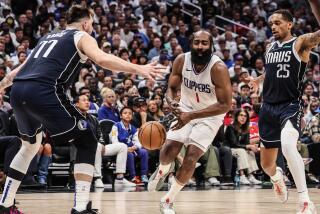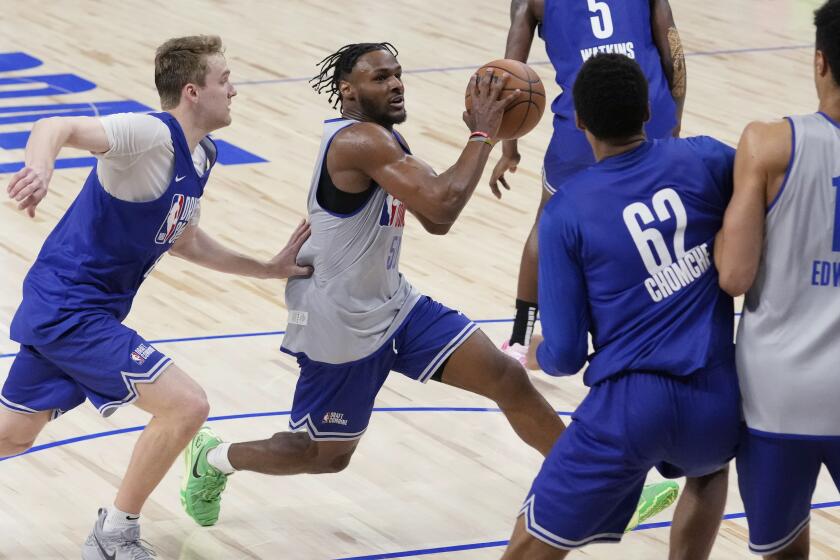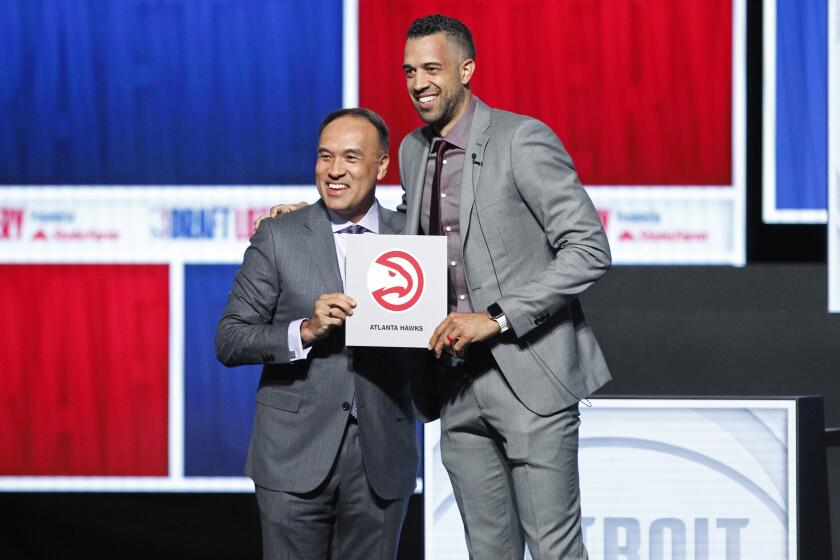Changes in Nixon Contract Sought : But Clippers Deny They Lack Money to Match Sonic Offer
Hours after receiving Seattle’s five-year, $2.7-million offer sheet to free agent Norm Nixon Friday afternoon, the Clippers asked Nixon’s agents to restructure the terms of the contract.
Clipper executives, who admit they made a request to restructure, denied allegations by sources who said that the club does not have enough money to match the offer as it is currently structured.
Agents Tom Collins and Fred Slaughter, who represent Nixon, said they will not restructure the offer sheet should the Clippers decide to match it.
So Clipper executives have 14 more days in which to match the offer, as is, or lose Nixon. The Clippers also are considering challenging the validity of the creative contract by taking Seattle to arbitration, a move that might buy the club more time to sign Nixon.
The main reason the Clippers sought to restructure Nixon’s lucrative offer sheet, according to highly placed sources familiar with the contract and the negotiations, is that Clipper owner Donald T. Sterling does not have available cash to pay Nixon.
“I don’t know whether that’s true or not, but that’s one of the considerations we took into account before structuring the contract,” said Ted Steinberg, an attorney who works on contracts for Collins, Slaughter and other sports agents.
The first year of Nixon’s contract calls for him to receive a $500,000 cash loan payable within five days of the start of the contract in addition to $150,000 cash. Sources say the Clippers do not have available cash to pay the $500,000 loan within five days, so the club proposed to make it payable over the length of the season.
“Absolutely false,” Clipper General Manager Carl Scheer said. “Sterling hasn’t even reflected upon the $500,000 loan yet. . . . If Sterling had to worry whether to raise $500,000, he would not be the owner of an NBA team.”
Club president Alan Rothenberg, who has worked with Sterling since 1982, said: “I’ve heard that poppycock about Donald Sterling for three years. It’s just as false as can be. We have the ability and the money to sign Norm. We have to decide if we want to spend the money.”
Scheer maintained the Clippers’ have “no other alternative but to match the offer sheet” and keep Nixon. Scheer said the club will make its decision as soon as general counsel Arn Tellem and Rothenberg check on the validity of the offer sheet. The Clippers say they have reason to believe Seattle’s offer may violate NBA salary cap restrictions.
Rothenberg, though, said the Clippers would probably would not make a move until sometime next week. “We have to review the contract, talk to the league. That takes time.”
Rothenberg said the reason the Clippers asked Collins and Slaughter to restructure the offer had nothing to do with Sterling’s finances. He said that the club just thought Seattle’s complicated offer to stay within salary-cap limit was “crazy.”
That’s not the impression Collins and Steinberg had upon hearing the request.
Collins: “It’s sad. The Clippers say they’ll match. But when? I think they’ve got some big problems ahead of them.”
Steinberg: “They simply came here today to restructure it so it would be easier for them to comply with the terms. They didn’t want that ($500,000 loan) payable in a lump sum.”
Under terms of Seattle’s offer sheet, Nixon also will receive $150,00 cash the second year as well as a $400,000 signing bonus. The third and fourth years are both worth $900,000. The fifth season is an option year for $650,000 or a guaranteed $200,000 buyout if Nixon is released.
Scheer would not say Friday whether Sterling feels Nixon is worth the contract Seattle has tendered. But Thursday night, Scheer said: “This is a lot of money, a big chunk to swallow. But he (Sterling) knows what we have to do. He knows we’ve got to get it done.”
According to Scheer, the structure of Seattle’s offer sheet to Nixon was a circumvention of the salary cap.
The contract is similar to the offer sheet the New York Knicks recently tendered to free agent Albert King. That offer included signing bonuses and more cash in the latter years of the contract.
The NBA claimed the Knicks circumvented the cap by stacking most of the cash for King’s salary in the years following the 1986-87 season when the league’s collective bargaining agreement expires. The Knicks argued that, since it isn’t certain there will be a salary cap in the future, the restrictions should not apply to money after the 1986-87 season.
Arbitrator Kingman Brewster ruled in favor of the Knicks, but the NBA is appealing. The appeal will be heard Nov. 25 in a New York federal court. If Brewster’s ruling is overturned, it could affect Nixon’s offer sheet.
If the Clippers decide to go to arbitration, they also could argue that the value of Nixon’s loan should be allocated over the four-year length of the contract (not counting the option year). That reportedly would put Seattle over salary cap limits.
Rothenberg and Scheer said they do not want to comment on the validity of the contract until they fully review it.
“Legally, and as sound business people, you don’t just pay $2.7 million without reviewing your responsibility to the good of the franchise,” Scheer said. “We could sign Norm tomorrow, it could be 15 days.”
More to Read
Get our high school sports newsletter
Prep Rally is devoted to the SoCal high school sports experience, bringing you scores, stories and a behind-the-scenes look at what makes prep sports so popular.
You may occasionally receive promotional content from the Los Angeles Times.





